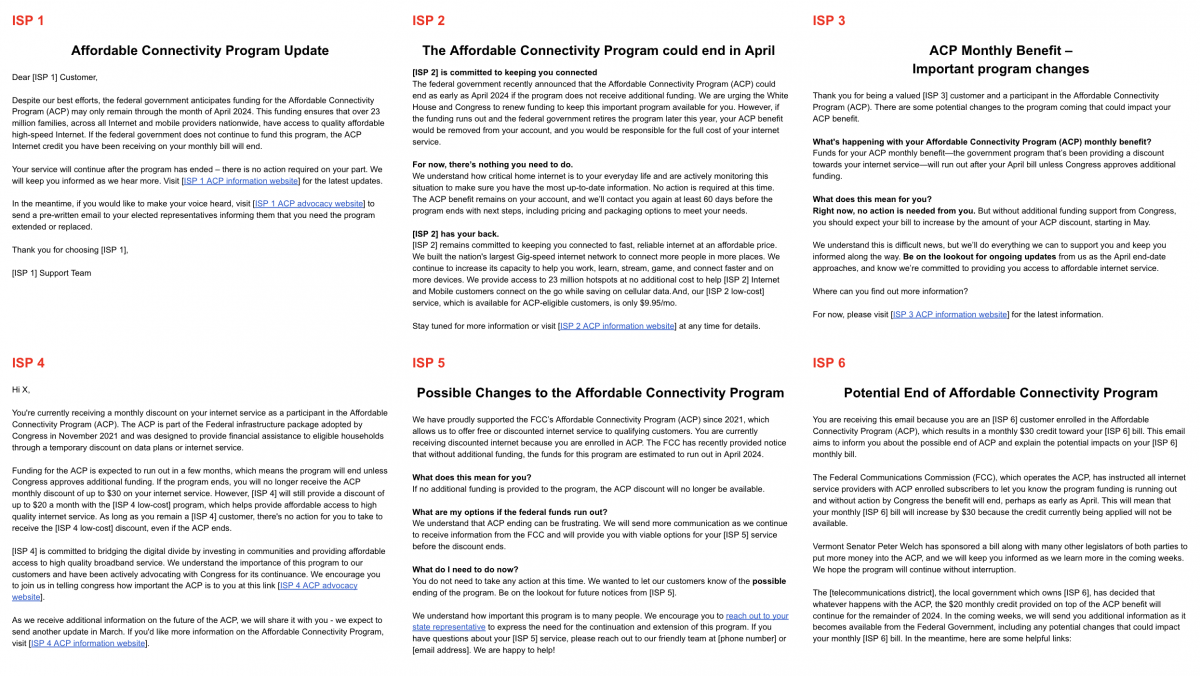Here’s What ISPs Are Telling ACP Subscribers Today
Thursday, January 25, 2024
Digital Beat
Here’s What ISPs Are Telling ACP Subscribers Today

Today is the first day of the end of the Affordable Connectivity Program (ACP). As you read this, one out of every six American households is being notified that their internet bill may soon become unaffordable.
The ACP is a federal benefit that is currently helping 22.8 million low-income households afford internet service. However, the ACP is running out of funding. If Congress does not act soon, the ACP will end this Spring and the millions of people who rely on it will experience a sudden bill shock.
In preparation for this possibility, the Federal Communications Commission (FCC) issued a guidance requiring internet service providers (ISPs) to send written notifications (email, text, letter) to their ACP customers. The first of these notifications must be sent by today.
That is why one in six households are currently confronting the fact that the cost of their internet service may soon go up. For many, the loss of the ACP will increase their monthly internet bill by well over 50 percent.(1) Given that nearly all ACP enrollees are in difficult financial circumstances,(2) such a bill spike could easily force them to drop service, reduce service quality, or sacrifice other necessities, like groceries and medication.
Today will be challenging for millions of Americans. It is imperative that ISPs give enrollees accurate and complete information. To ensure this happens, the Benton Institute for Broadband & Society has reviewed notifications from over half a dozen major ISPs. You can view an anonymized sample of these notifications here.(3)
For the most part, these notifications are concise and appear to meet the FCC's minimal requirements (at least the requirements for the first notification). However, many notifications lack resources and information that would be helpful for those enrollees who are confused, facing unaffordable bills, or at risk of falling into debt. Among the notifications reviewed, the following trends emerged:
"For now, there’s nothing you need to do."
-ISP 2
-
Action Needed: Nearly all notifications indicate that “no action is needed” by the enrollee. While technically true, “no action” will result in the enrollee being subjected to the full undiscounted rate when the ACP ends. In reality, an enrollee should take at least two actions:
-
Contact their Members of Congress and ask them to fund the ACP.(4)
-
Consider if and how they will stay connected without the ACP. Can the enrollee still afford their current service? Does the ISP have more affordable options? In the absence of the ACP, might another ISP be a better fit?
-
-
Bill Impact: Few notifications explicitly state what will happen to the enrollee's bills (i.e. the bill will increase by $30/mo). No notifications clarify the total that will be owed without the ACP.
-
Customer Support: Few notifications offer direct contact information (phone, email) for customer service or digital navigators. Not only does this inhibit enrollees from finding support at a critical time, it raises questions about ISPs' ability to effectively manage a potentially unprecedented wave of inquiries.
-
Language Support: ISPs are required to send notifications in the enrollee's language of choice (as selected during enrollment). It is unclear to what extent this is occurring, but within the sampled notifications, there were few options for toggling language.
-
Cancel Anytime: Zero notifications indicate that enrollees may cancel service at any time and at no penalty. Enrollees have this ability, and, now more than ever, it is critical that they understand it.
-
Call Congress: Only half of the notifications suggest that customers can contact their Congressional representatives. Congress is actively considering relevant legislation (e.g. the bipartisan, bicameral “Affordable Connectivity Program Extension Act of 2024”). If enrollees wish to keep their ACP, they should understand what to do.
To be clear, the fact that the ACP may end is not the fault of ISPs. That choice rests solely with Congress. But as our most vulnerable neighbors—low-income households, veterans, students, seniors—receive disturbing news today and potentially face months of uncertainty followed by bill hikes and/or disconnections, it is important for ISP communication to be clear, comprehensive, and forthright. Two additional notifications are required from ISPs, and the FCC may send additional notifications itself. The Benton Institute will continue to monitor the ACP wind-down process to ensure enrollees' best interests are kept at the forefront.
Notes:
- The median broadband bill in 2022 was $74.99. At this price, an ACP enrollee would have to pay a discounted rate of $44.99. Without the ACP, that rate would climb by $30, which is a 66% increase over $44.99. Note that this percentage is likely an underestimate since ACP enrollees may prefer plans that are less expensive than the median, so any percentage increases would be larger.
- For example, they are individuals making less than $30k/yr, or families of four with combined income under $60k/yr.
- Identifying information about the customer and the provider have been removed to ensure anonymity.
- Elsewhere in the notifications, some ISPs do suggest enrollees contact their members of congress.
Visit DontDisconnectUS.org for more information about ACP funding.
Thank you to the many enrollees and partners who shared notifications and made this analysis possible.
Please continue sharing notifications with Drew Garner, dgarner@benton.org
The Benton Institute for Broadband & Society is a non-profit organization dedicated to ensuring that all people in the U.S. have access to competitive, High-Performance Broadband regardless of where they live or who they are. We believe communication policy - rooted in the values of access, equity, and diversity - has the power to deliver new opportunities and strengthen communities.
© Benton Institute for Broadband & Society 2023. Redistribution of this email publication - both internally and externally - is encouraged if it includes this copyright statement.
For subscribe/unsubscribe info, please email headlinesATbentonDOTorg







